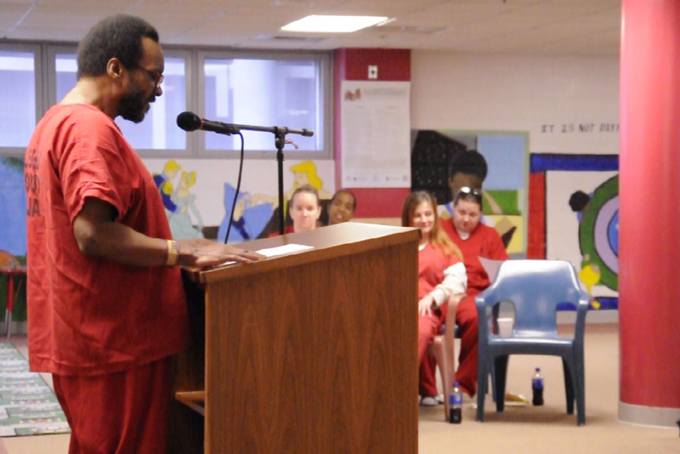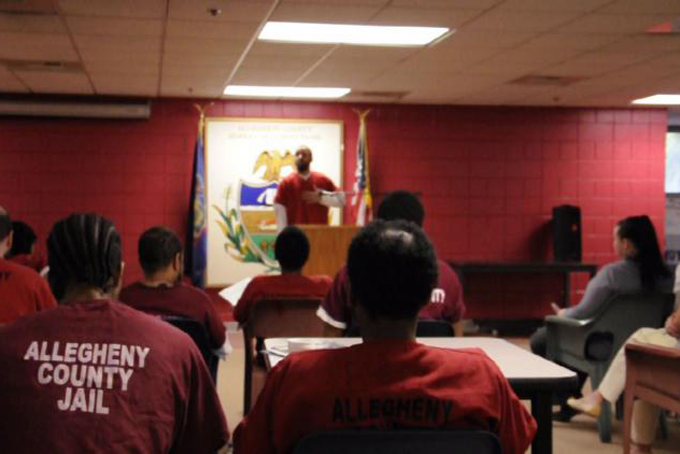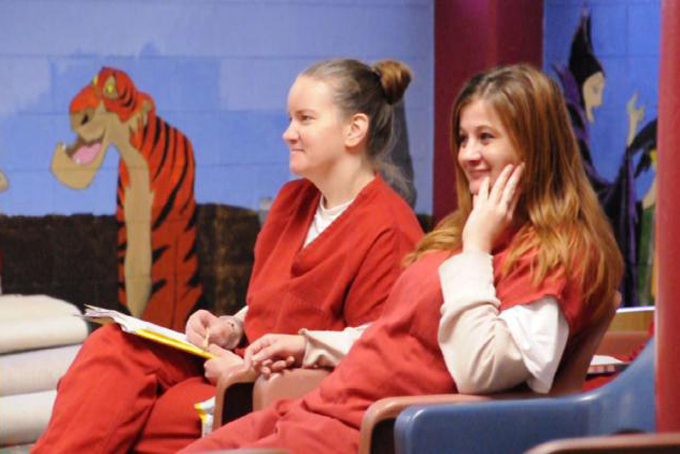
Few inmate education programs in Pennsylvania
Brother Umar wears ketchup-colored jail garb. He’s been locked up for 14 months, but his words earn him snaps as if he’s at a hipster coffee shop.
“For good Abel can’t help but to sacrifice his life to this ‘caine that’s so fatal,” he recites, part preacher, part emcee. Then, conversationally: “That’s Cain and Abel.”
Umar, whose real name is Chris Westbrooks Jr., is in the Allegheny County Jail awaiting trial on charges of attempted murder and aggravated assault in connection with a 2013 shooting in Duquesne.
Today, though, is like a graduation. It’s the final meeting of inmates in the Words Without Walls program, a weekly course taught by Chatham University graduate students.
His fellow inmates hold pages of their own poems and stories written over the summer. They are reminiscences and laments. Some are humorous, others raw. Some dig into the mistakes and addictions that put them here in the first place.
Every school term, a handful of the jail’s male and female inmates attend a weekly three-hour class on creative writing, which concludes in a final reading that brings the groups together.
Through the program, they learn to channel feelings like anger and loss into something constructive, one of the program’s main goals.
“Instead of going out on the housing pod and knocking heads, we’ve had guys that’ll go back to their pods or back to their unit and start to write,” said Jack Pischke, the jail’s inmate program administrator.
[youtube=https://www.youtube.com/watch?v=E3KEmIpEjrM&w=560&h=315]
‘Punishment over education’
For the inmates, Words Without Walls is a chance at education beyond the basics.
While in jail, inmates are encouraged to work toward their GED – something that’s mandated if they’re moved to state prison. They also receive some instruction on job and social skills. But opportunities for learning beyond the high school level are scarce.
“They need to bring more programs to the jail,” inmate Kim Faber said at the final reading. “A lot of the inmates don’t know how to read and write.”
At the State Correctional Institution – Pittsburgh, where the Chatham creative writing teachers began classes this month, inmates used to be able to work toward a degree or certificate at a cost of $50 for each three-credit-hour course. The state paid the rest.
But funding was cut off about seven years ago, the prison’s school principal said in an email.
State prison inmates are allowed to take correspondence courses from a handful of schools, but they have to make arrangements for someone outside prison to front their tuition. Inmates at SCI Pittsburgh can also take one free college enrichment course.
Correspondence courses aren’t available at the county jail because most inmates aren’t there long enough to complete them.
Some organizations offer volunteer courses at various state prisons and local jails, but nothing exists statewide, and state and federal inmates are no longer eligible for federal Pell Grants.
As a result, many inmates lack something constructive to work toward.
“You see more and more how we value punishment over education,” Sheryl St. Germain, director of Chatham’s creative-writing graduate program, said of the corrections system.
Education, she said, can be transformative and gives inmates a positive focus while serving time.

Words Without Walls started in 2010 as an adaptation of an earlier program at the Allegheny County Jail by Pittsburgh writer Sandra Gould Ford. Recently, program leaders decided to expand to SCI Pittsburgh.
The jail houses defendants awaiting trial, as well as some inmates who have already been sentenced. Only model inmates are eligible for Words Without Walls.
The program doesn’t offer college credit, though it is intended to give inmates a healthy outlet for their emotions and teach them to critique and accept criticism for their work.
“A lot of people were learning how to literally express themselves,” former jail inmate Eric Boyd said in an interview.
In 2012, Boyd placed second in the national PEN prison writing contest for fiction, and he now commutes from Pittsburgh to the Writer’s Foundry Master of Fine Arts program at St. Joseph’s College in Brooklyn.
At the beginning of the jail program, Boyd said many of his classmates didn’t know how to put a sentence together, though they were eager to learn. Education levels vary, St. Germain said, and inmates in the classes have had degrees all the way up to a Ph.D.
Storytelling as service
For the Chatham instructors, Words Without Walls gives M.F.A. students a chance to teach topics like story structure and symbolism to students who might be exposed to them for the first time.
Instructors break literature down to the basics, and they work in technical lessons while talking about broad themes like family and addiction.
Sarah Shotland, program coordinator for Words Without Walls, said the program lets the graduate students balance creative writing – an isolated, artistic pursuit – with community service.

After teaching in the jail, Chatham instructors have started similar programs in New Orleans and North Carolina.
The program also takes creative writing out of stuffy academic halls and shows that poetry can be understood by anyone.
“Academia can be kind of elitist about this,” St. Germain said. “Really, the first kernel of writing is about wanting to tell your story.”
St. Germain, an award-winning poet and memoirist from New Orleans, said writing for her initially served as a kind of therapy.
Her father was a drunk. Her drug-addicted brother served time in prison. St. Germain started keeping a journal when she was around 10, and those words were seeds for the poems and stories she’d later write.
The inmates find that same kind of release.
“I try to use it to make a bad situation funny,” inmate Lauren Buzard said. “I’d rather laugh than cry.”
Westbrooks said his classmates learned the most not from the formal lessons but from writing and critiquing each other’s work.
“We helped each other develop,” he said.
The inmates in the program are bound for different destinations. Some will serve more time in jail. Some will go to prison. Some to drug treatment. Others home.
The instructors said they hope their students have discovered a new talent, and they can channel the energy that used to go toward crime and addiction into creative work.
“That spark is there now,” Shotland said. “You can’t unknow that you’re a writer now when you catch that bug.”
Reach Jeffrey Benzing at 412-315-0265 or at jbenzing@publicsource.org.
A Light in the Darkness
Spiritually enlightened, intellectually elevated.
I must shine bright, be a light in the darkness, a voice of reason,
exposing the treasons of those who chose or annoyingly cast spells of the generation of degradation upon my generation, and the generations before.
It’s about color no more. Only two races exist, the rich and the poor.
The poor are the slaves, taught to bow and obey.
Instead of slaves they stay consumers, instead of whips and chains they use the media and courts to abuse us.
Bankrupting us morally, forcefully subjecting us to perversity.
Teaching us vice in the place of virtue, and vice versa.
Making the poison sweet and the antidote seem to be what hurts us.
They hypnotize, blind and divide us, teach us to focus on our adornments instead of what lies inside us.
And even worse, they use us to confuse us, so they don’t have to soil their hands.
It’s such a wonderful, horrible plan.
Enslave them all but let them believe they are free.
How can a slave rebel when he thinks all is well?”
— Poem by Chris Westbrooks, Jr. (also known as Brother Umar)
Watch a video about the Words Without Walls program at https://publicsource.org/investigations/jailhouse-poets-find-voice-writing-course#www-video
THIS ARTICLE ORIGINALLY APPEARED AT:
https://publicsource.org/investigations/jailhouse-poets-find-voice-writing-course#.U_sz3aPc_N4
